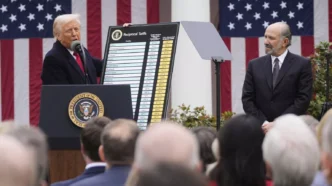Tariffs are no longer temporary tools used in political spats—they’re becoming a permanent fixture of U.S. economic policy. Unless Congress regains its authority over trade policy, American businesses should brace for a future where tariffs are a constant part of the landscape. That means startups must evolve, fast.
Tariffs, in essence, are taxes on imported goods. They’re often misunderstood, but they aren’t inherently good or bad. Used wisely, they can shield domestic industries from unfair competition—say, from factories abroad using forced or underpaid labor. In tough economic times, tariffs also offer a way to pump revenue into federal budgets already weighed down by mounting debt. But when overused, they can cripple consumer spending and stall innovation.
At Era Ventures, we back real-world startups—companies building hard tech or operating in physical marketplaces. These are the very companies that tariffs hit first. So we’ve been tracking this evolving trade terrain closely and helping our founders navigate it.
Tariffs Are Becoming the New Normal
Today’s White House has doubled down on protectionist policies. A sweeping 10% global tariff on imported goods could soon be reality, with particular focus on sophisticated industrial imports and strategic sectors. While essential goods like coffee or bananas might get exemptions, most others won’t be as lucky.
If history is any indication, we can look to the last Trump administration for clues. Its 2018 tariffs on China were largely upheld—and in some cases expanded—under Biden. Tariffs used as negotiation leverage with allies like Canada and Mexico were mostly short-lived. But when it comes to strategic rivalries, especially with China, tariffs are sticking around.
A Shifting Trade Map—and a Fragmented Future
During 2018, the U.S. hit $250 billion worth of Chinese goods with tariffs. China hit back with $110 billion in retaliatory duties. Both sides targeted everything from electronics to heavy machinery. That tit-for-tat has only intensified in recent years, especially as the U.S. seeks to secure critical technologies like EV components and solar cells.
Yet, tariffs remain fluid. The current administration is still negotiating trade deals that may reshape who’s taxed and who’s not. Founders should avoid rigid thinking. Staying informed and ready to pivot isn’t optional anymore—it’s the only way forward.
Local Manufacturing? Yes—But Only for the Right Products
Yes, we need to bring certain manufacturing sectors back home—particularly those tied to national security, like semiconductors. But rebuilding entire supply chains domestically is unrealistic. Most low-end manufacturing remains too costly to do in the U.S., unless robotic automation makes huge leaps. And with near full employment, there’s little appetite for mass manual labor in the States.
That’s why we’re seeing a push toward supply chain diversification, not reshoring everything. China’s dominance in manufacturing created convenience—but also over-dependence. And now, startups must rethink their sourcing strategies.
Countries like Mexico offer compelling alternatives, with labor costs rivaling or beating China’s, minus the ethical baggage. This fragmentation isn’t just a headache—it’s a massive opportunity.
Startups Must Lead the Procurement Revolution
Fragmented global supply chains need new tools and platforms. That’s where startups can win. Industries like construction, which accounts for a whopping $2.2 trillion in annual U.S. spend, remain highly decentralized. Most firms don’t have the staff—or systems—to run efficient procurement. That opens the door for digital marketplaces that connect U.S. businesses to new suppliers abroad.
The “why now” for cross-border marketplaces is stronger than ever. Founders should look at outdated, opaque industries and ask: Can we help them source better, faster, cheaper—from places they’ve never considered before?
That mindset—scrappy, curious, and nimble—is what will define the next generation of breakout startups. Tariffs and trade shifts aren’t just barriers. For the right entrepreneur, they’re launchpads.













